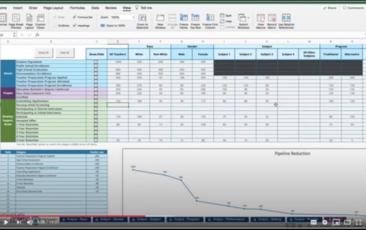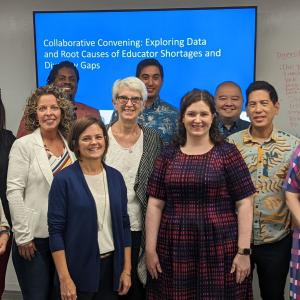Prioritize Systemic Educator Talent Development | GTL Center

Replace Piecemeal Policies with a Systemic Approach
With so many separate educator talent management initiatives—from preservice training to professional development and compensation—and with district, state, and federal involvement in teacher policies, policymakers often have adopted a piecemeal approach to dealing with this system-level issue, particularly under times of crisis.
The GTL center has provided an extremely helpful resource with the Talent Development Framework. It is chock full of thoughtful questions and recommendations that are directly in line with our approach.
Michael O'Connor, Rhode Island Department of Elementary & Secondary Education
In response, we developed the Talent Development Framework, which provides an opportunity and a road map for state- and district-level policymakers to systemically improve educator quality, address teacher shortages. and improve equitable access for all students.
By promoting a comprehensive, systemic approach, the framework helps state and district leaders:
- Proactively and purposefully address talent challenges per local context;
- Make sense of talent challenges across the educator career continuum by illustrating and systematizing the complexity of developing human talent in education; and
- Take a more strategic approach to securing the teachers and school leaders needed to create a strong, equitable education system.
Top Resources

The Talent Development Framework: Improving Access to Excellent Educators for All Students (May 2020)
Read the full Talent Development Framework (TDF) to begin your journey to proactively and purposefully address educator shortages and talent challenges in your local context. Our team can support your state in applying the principles of the TDF to meet the needs of your unique COVID-19 talent challenges.

The Talent Development Data Tool (May 2020)
The Talent Development Data Tool is an easy-to-use, Excel-based tool to visualize teacher workforce data across the full educator career continuum, including disaggregating teacher workforce data to identify teacher shortages by segments like subject area, school type, income level, geographic area, and race or ethnicity. Our team can support states in using the data tool with cross-agency teams, district leaders, educator preparation providers, and other key stakeholders to hold data-driven, grounded conversations to identify top talent challenges, root causes, and relevant strategies.

Advancing Quality Teaching for All Schools: Examining the Impact of COVID-19 on the Teaching Workforce (August 2020)
Examine projections about the impact of COVID-19 on the teacher workforce and explore recommendations for addressing resulting challenges.

Investing in Talent Development: A Funding Guide for Supporting the Teacher Workforce with Federal, Private, and State Funds (June 2020)
Funding the important work of teachers can be supported through a variety of federal programs, private foundations, and state legislative appropriations. This guide identifies potential funding that can be leveraged by states, districts and educator preparation providers to address teacher professional growth and talent development across the full educator career continuum.
Featured Project

National Collaborative on Educator Workforce Shortages and Diversity (2022-2024)
To support states in addressing urgent educator workforce challenges, in 2022, the Center engaged three state teams from Hawai'i, Ohio, and Louisiana to participate in a National Collaborative. This two-year, data-driven facilitated coaching process helped state teams understand the root causes of shortages and gaps in educator workforce diversity and find solutions that are equity-focused and built for sustainability.

GIS Mapping to Strengthen the Educator Workforce in Colorado
In collaboration with the Region 12 Comprehensive Center and the Regional Education Laboratory Central (REL Central), AIR's GTL Center staff supported the Colorado Department of Education in developing GIS maps to better understand and address educator shortages in the state.

